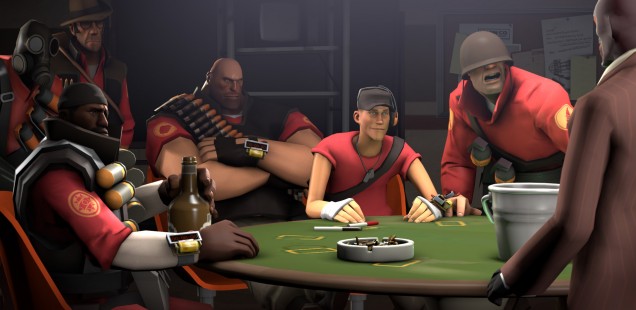Written for Haywire Magazine.
A good character is one who, simply by existing, begs the curiosity for further exploration.
Good characters will burrow their way into players’ minds, rearranging our mental furniture and inciting our desire to dig deeper and delve further. Really great characters will do this subtly, as if their simply being is reason enough to further intrest.
One of the strangest examples of this is Team Fortress 2’s Heavy Weapons Guy. A stocky, seemingly slow-witted eastern European with an unhealthy attachment to his minigun and a healthy one with his field medic. He’s a little stocky, more clumsy than not, a force of grandiose vibrancy on the battlefield, but much quieter and subdued off the battlefield. While his face is expressive and earnest, he is really a stoic participant in the perplexing clone-army battle for the worthless quarries of Redmond and Blutart.
Compared to even to the simplest RPGs in their third or fourth generations, the Team Fortress 2 characters are almost starved of characterization. They are well-acted cartoons, only as deep as the cardboard of their character tropes, and never really aspiring to be much grander. Yet, Heavy is perhaps the exception to this rule, especially when viewed in Poker Night at the Inventory.
When Heavy is not waging hellish war in the dust-ridden hills and valleys of the quarry, however, he can sometimes be found at The Inventory, a lavishly appointed speakeasy attended by various game characters in their off-time. There, he’ll play high-stakes Texas Hold’em, and reveal a great deal more about himself. The quiet giant is no pushover player, and is much more verbally stimulating over the poker field than the battlefield. Despite his soft-spokenness, he brings the same level of passion to poker as he does to combat.

During the course of playing, Heavy will reveal a great deal more about himself than the average Team Fortress 2 player will find out. Heavy, despite what his appearance and languid speech patterns might suggest, actually has a degree in Russian Literature, a field of study that — allegedly — shares a great deal with contract killing.
Garnering tidbits about Heavy around the poker table gives us a deeper glimpse into an otherwise lackluster character. He emotes in grandiose ways, and his jeers and shouts have their own depth of personality, but only relative to other battle-hardened warriors.
The biggest tragedy is that Heavy has just enough dialog in Poker Night at the Inventory to be an interesting, more fully developed character. But only just. He has his highs and lows, his voice has rich dynamics and feels more nuanced. He isn’t just a heavy built mercenary, he’s also a coin collector who loads his own rounds, has a doctorate in of Russian Literature, and is an interested conversationalist. He isn’t just Heavy Weapons Guy, anymore. In fact, once we get to know him better, “Heavy” almost feels more brash and demotic to his character than it might feel to do so for other Team Fortress characters.
Wider characters, those whose lives and personalities are interesting enough to merit exploration, are unfortunately finite. Once the piece of media they’re attached to concludes, or gets canceled, or reaches its end state, the character’s depth likewise vanishes. As personable or interesting as they may be, they’re just avatars for the narrative. Without the narrative, or sustained meaning, their depth is lost or easily forgotten.
What is really lost, however, is the opportunity for what could have been an infinitely rich, or at least enduringly interesting, character to shine brighter and longer. Characters like these outlive their works, and they settle in the mindspace with a cooler and a folding chair, present enough to bear thinking on but yet somehow, still incomplete. They’re full of the untapped potential, implied by what characterization they have.

If, for a moment, Heavy were to exist beyond his pieces of media, he might have incredibly interesting things to say. Though the Heavy we encounter is no doubt more interested in large caliber bullets, he is still a character who theoretically had to defend a thesis on Russian Literature. Outside of incessant shouting, could the docile Heavy even sound academic? What could a man like Heavy say on the subject, and how would his battle-minded perspective be applied to Russian Literature differently than traditional academic perspectives?
Unfortunately, such exploration is an exercise in speculation. Heavy, like all of the characters in Poker Night, and the respective pieces of media, exist in limits. There is nothing else to them. Even the stories they tell stop cold with the credits. Anything beyond, even extrapolation, is going to be more parts speculation than reality. Yet, they’re still worth contemplating. All good characters are, in their ways.
There is a profound sense of loss in that, though. Without even having actually existed, the empty folding chair and water-dripping cooler in the mental landscape feels utterly alien, empty, missing, and morose. The feeling is strange, to disconnect from reality and feel so closely attached to nothingness. There was nothing to lose, but the absence feels like a loss all the same. Good characters, especially, leave deeper pangs of longing in their absence.
Good characters are ones who, simply by existing, leave a void that begs fulfillment. Omnipresent in the mind, but tragically absent.

Thoughts?